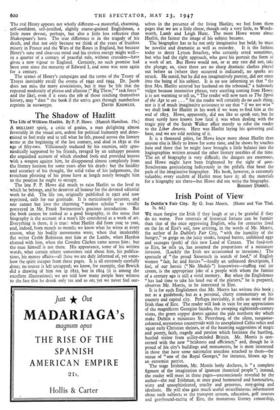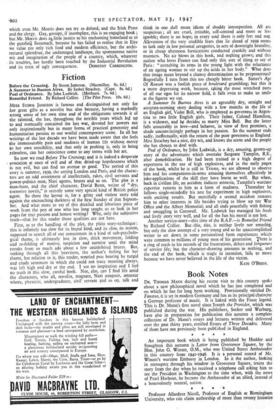Irish Point of View
WE must forgive the Irish if they laugh at us ; be grateful if they do no worse. Few reversals of historical fortune can be funnier than that of the once oppressing English, who for centuries lived on the fat of Eire's soil, now arriving, in the words of Mr. Morris, the author of In Dublin's Fair City, " with the humility of the hungry," to gorge on the juicy steaks, heaped butter, unlimited eggs and sausages (pork) of this new Land of Canaan. The food-trek to Eire, he tells us, has assumed the proportions of a miniature invasion. (Luckily the Irish are accustomed to invasions.) The spectacle of " the proud Sassenach in search of food," of English women "fair, fat and forties "—hardly an unbiassed description, I feel, of our heroic (" No Medals ") housewives—stuffing real ice cream, is the appropriate joke of a people with whom the famine of a century ago is still a vivid memory. But when the Englishman "has had time to take his head out of the platters," he is prepared, observes Mr. Morris, to be interested in Eire.
It is for such Englishmen that Mr. Morris has written this book ; not as a guidebook; but as a personal, chatty commentary on his country and capital city. Perhaps inevitably, it tells us more of the Irish than of Eire. The reader will look in vain for any appreciation of the magnificent Georgian facades, the sweeping eighteenth-century vistas, the green copper domes against the pale northern sky which make Dublin a miniature St. Petersburg, of the silent, turquoise- coloured, mysterious countryside with its unexplained Celtic relics and squat early Christian shrines, or of the haunting suggestions of magic and poetry,' faith, tragedy and passion which fascinate the hustling, hustled visitor from utility-minded Britain. Mr. Morris is opn- cerned with the new "briskness and efficiency," and, though he is proud of his city's •buildings and monuments, he is most interested in those that have some nationalist anecdote attached to them—the statue of " one of the Royal Georges," for instance, blown up by an extremist patriot. The stage Irishman, Mr. Morris hotly declares, is " a complete figment of the imagination of ignorant theatrical people "; instead, the reader will meet in these pages—unconsciously revealed by the author—the real Irishman, at once good humoured and humourless, witty and unsophisticated, touchy and generous, easy going and idealistic. He will also gain much useful miscellaneous information about such subjects as the transport system, education, golf courses and greyhound-racina of Eire, the monstrous literary censorship, which even Mr. Morris does not try to defend, and the Irish Press and the clergy. Gay, gossipy, if incomplete, this is an engaging book ; but Mr. Morris does ab little justice to-his enchanting homeland as to the guzzling Sassenach, because he has failed to realise that in Eire we value not only rich food and modern efficiency, but the archi- tectural splendour, the undamaged landscape, the spontaneous native wit and imagination of the people of a country, which, whatever . its troubles, has hardly been touched by the Industrial Revolution



































 Previous page
Previous page